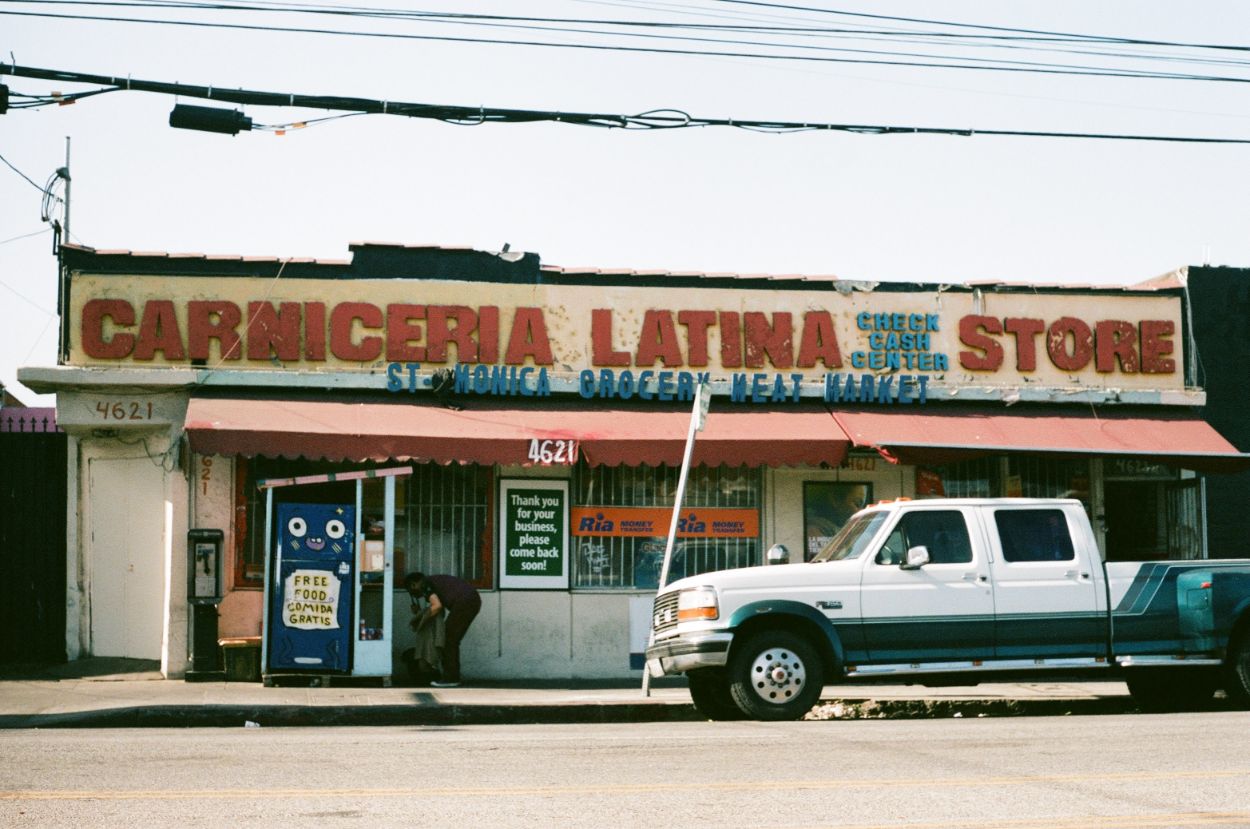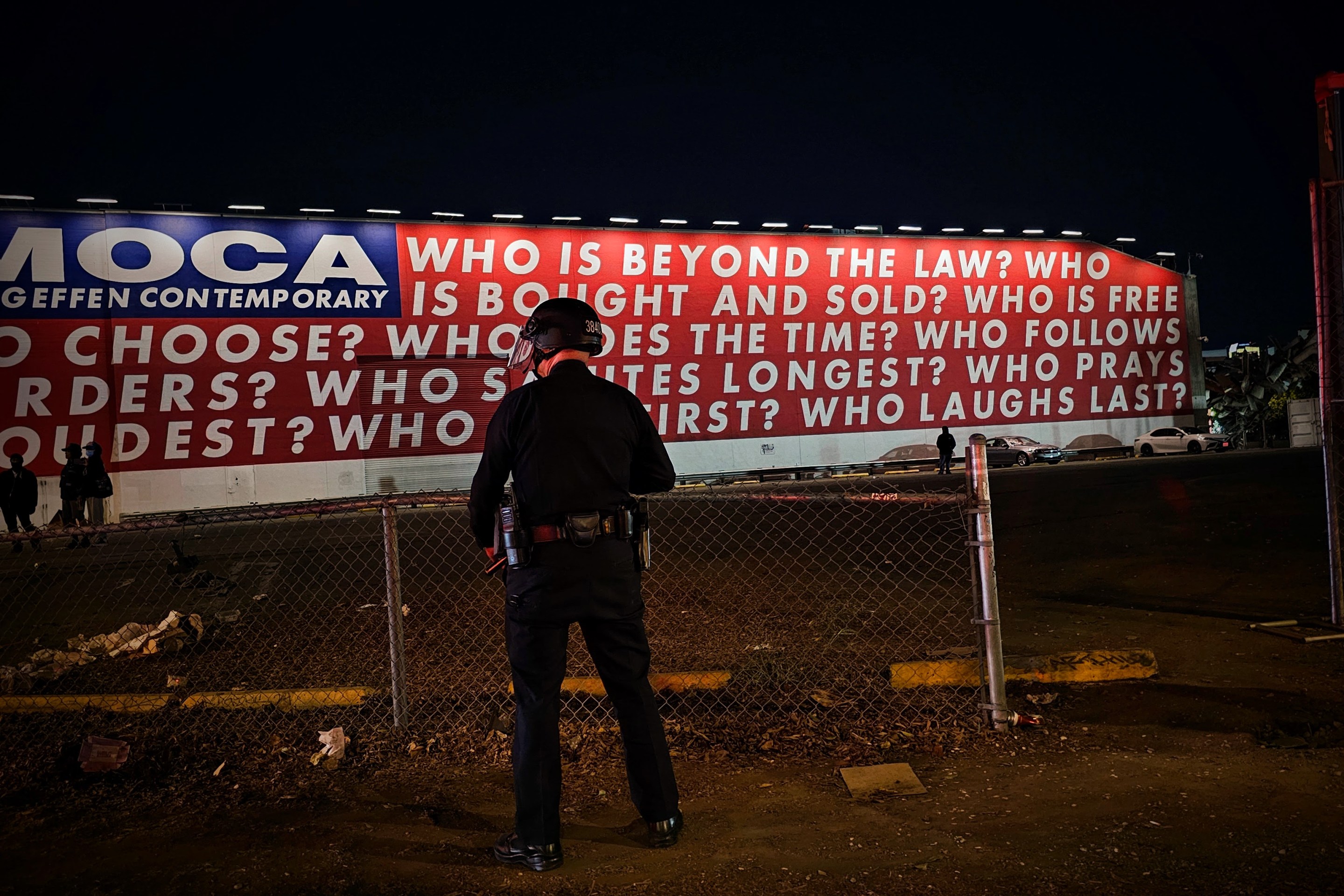If you drive down Santa Monica Boulevard in East Hollywood, from Sunset Blvd toward the 101 Freeway, you’ll pass the Virgil bar, a couple of Salvadorian eateries, maybe a few taco trucks, and right before you hit the Vermont Red Line Metro stop, you’ll see Santa Monica Grocery. You might notice a refrigerator placed on the sidewalk in front of the carnicería and tiendita. The fridge is painted a dark blue, adorned with black and gold lettering “Free Food or Comida Gratis.” There’s a baby blue pantry on its right side, where a bouquet of french baguettes wrapped in wax paper pokes out of the top shelf.
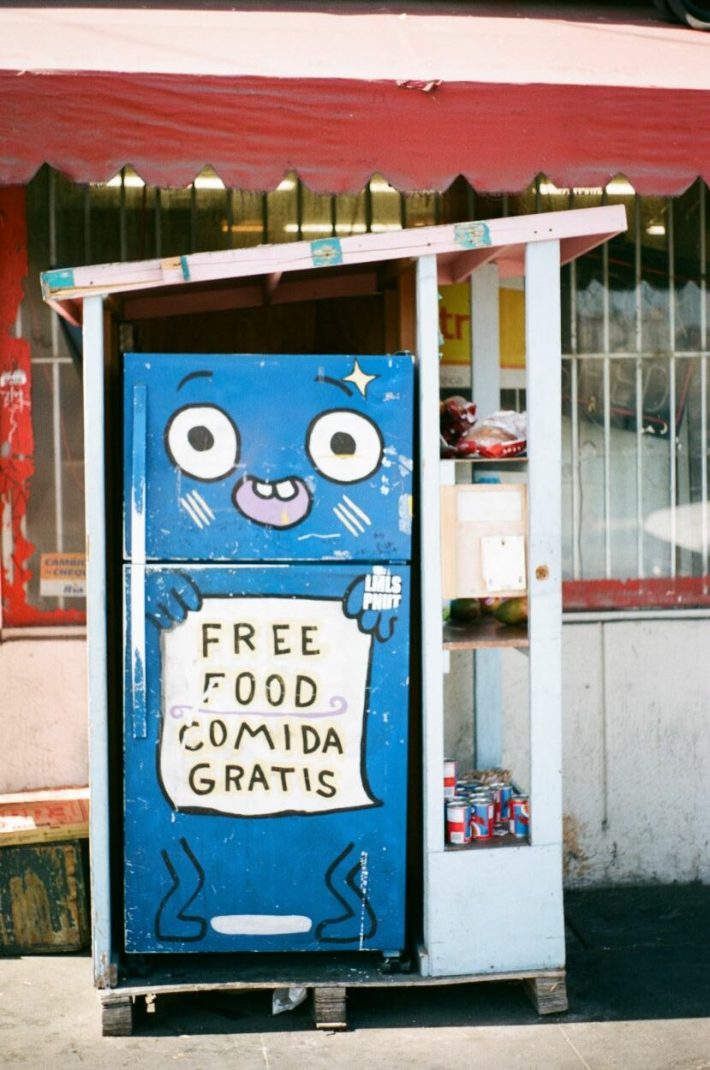
This East Hollywood fridge is part of Los Angeles Community Fridges (LACF): a network of 23 currently active fridges across the LA area, from South Central to Long Beach, from Van Nuys to Uptown Whittier. It started in 2020 in response to the heightened need for mutual aid efforts during the pandemic. To this date, 21 fridges have closed for a variety of reasons, like volunteer burnout, city citations, and lack of resources and donations.
Writer and comedian Andrea More has been one of the main organizers of the East Hollywood fridge and is just one of many Angelenos who flocked to LACF in 2020, “I was involved from day one,” she said.
She first heard about LACF when she started distributing produce and other pantry items with an already established mutual aid group called Mutual Aid LA, which still helps distribute food to other fridges in the L.A. area. In her free time, she restocks it with food, raises money for donations, cleans it when it’s overflowing with old groceries, and builds relationships with the community that frequents it.
On a clear day in early June, Andrea made a regular resupply trip. She pulled into the Rite Aid parking lot that’s a few dozen feet away from the Santa Monica Grocery Store storefront. She unloaded a couple of crates and insulated grocery totes filled with a variety of fruit cups from her Prius’ trunk, “It’s $280 worth of fruit. 40 cups of fruit,” she explained.
As she turned around the corner onto the windy, heavily trafficked street, about four people were standing in front of Santa Monica Grocery. Someone noticed the bundles of pineapple, mango, and watermelon, and he asked right away, “Can I get some food?” Andrea responded, “Yeah!” He grabbed one cup and then went for a second, “Wow, thank you.”
Another guy pulled up on his bike, but most of the fruit cups had already been taken. “I guess I’m really late on this. It went pretty quick. It doesn’t go to waste.” said Sir, who stays nearby and recently discovered the fridge. He didn’t know it existed until one of his friends told him it was open to everyone. But Sir and others agreed that they can’t rely on it as a food source.
The store owner, Dario Cruz, was unloading groceries from an old Ford pickup truck parked out front. He looked at the fruit that Andrea had just finished unpacking, “This is gonna go really fast. This [fridge] doesn’t get food at all. It just gets emptied right away.”
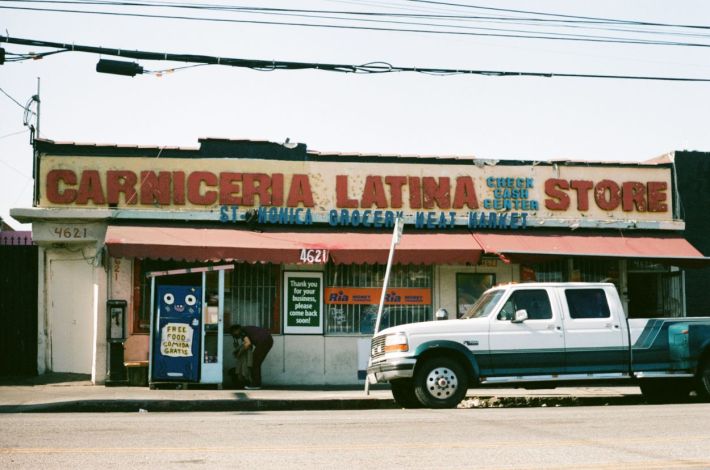
Dario and his wife, Yadira Cruz, own and run the grocery store—whose aisles are packed with canned Goya products, chiles secos, and fresh produce. In one corner sits a clear, plastic pastry case filled with pan dulce—behind the deli counter are chilled cuts of red meats like bistec and carne molida de res.
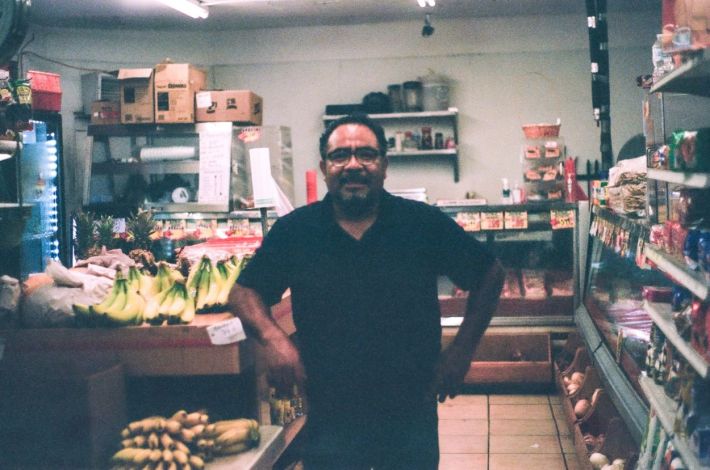
Andrea doesn’t want the fridge to be a burden on the store owners. But she knows sometimes; it can be. Sometimes, they do end up taking care of the fridge when no one from LACF can, like tossing any produce that goes bad, cleaning up any spills, and throwing away empty boxes that get left out. “They're doing it because they're kind people. I think that it's hard when people [from LACF] get burnt out because it does fall on the shop owner…They try to be hands-off,” said Andrea.
Dario and Yadira welcomed the fridge in 2020 with open arms when they noticed a lot of their regular customers couldn’t afford groceries. They’re also the store’s only employees, working almost every day to keep it open—with the exception of their 17-year-old son Alex who fills in on occasion. Alex once told Andrea that the people who come into Santa Monica Grocery remember shopping at the store when he was a baby, watching him grow up under the store’s fluorescent lights and tiled floor.
The community around the store is mostly Latino, Black, and Brown folks who both take from the fridge and donate. That’s an important distinction that Andrea and other organizers try to emphasize. The fridges aren’t charity—they’re available for everyone in the community to use. Establishing the fridges as mutual aid often helps remove any negative stigma attached to folks on the receiving end, according to LACF organizers.
Andrea has engaged with many folks who use the fridge. She said some are unhoused, and others stay in the College Hotel across the street and bring food back to their rooms. Sometimes families walk by and pick up a loaf of bread on their way to the Metro. “It's just a very diverse group of people…. I think it's a majority of people who are housed, but maybe housing insecure, or low income and immigrants,” said Andrea.
The fridge’s location on the sidewalk provides the community with 24/7 access to food and pantry items, when the fridge is stocked. Anyone can come and go at any time of day and grab what they need. However, there are downsides to keeping a fridge outdoors.
Sometimes the fridges will fill up with food that isn’t easy to prepare or ready-to-eat. “You just don't know whether those people are going to be eating that food for the rest of the week. You know, how many family members do they have? Are they sharing it with their homeless neighbor?” said Andrea. The advice she offers to people who want to help stock the fridge is to bring things that they would find enticing and want to eat themselves. “Like if you saw a big box of bell peppers that were sitting on the ground, not accompanied by produce bags, would you touch that? Or would you wonder, how long has that been sitting out?” she asked.
Across town, sitting in front of L.A. Road Thrift Store, is the aqua-painted Glassell Park fridge. Nikki Nguyen is a marketing coordinator for World of Wonder and organized the community fridge with two other neighbors, using a checklist from LACF to get it up and running. Nikki thinks it’s important to have it outside so everyone can have access to it whenever. But, because it’s outside, it’s a little more vulnerable and can require more upkeep, “We had a problem before where people were donating like an excess amount of food, and it would overcrowd the fridge and go rotten. So that was an issue,” said Nikki.
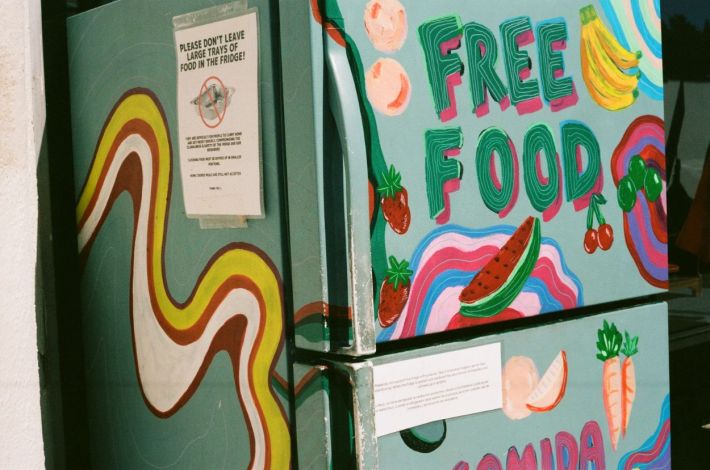
Folks in the community who donate groceries in bulk—without organizing with LACF—are an ongoing issue that Andre, Nikki, and other fridge organizers have to manage. Nikki said while it’s great that people want to get involved and contribute, it can be an issue when others donate food without thinking about how someone’s going to eat it or without considering the cultural preferences of the community, “Some people will donate like 100 cucumbers, and then they'll just shove it into the fridge. It's like, no one's going to eat it… and then it just goes bad… And now we're responsible for this waste.”
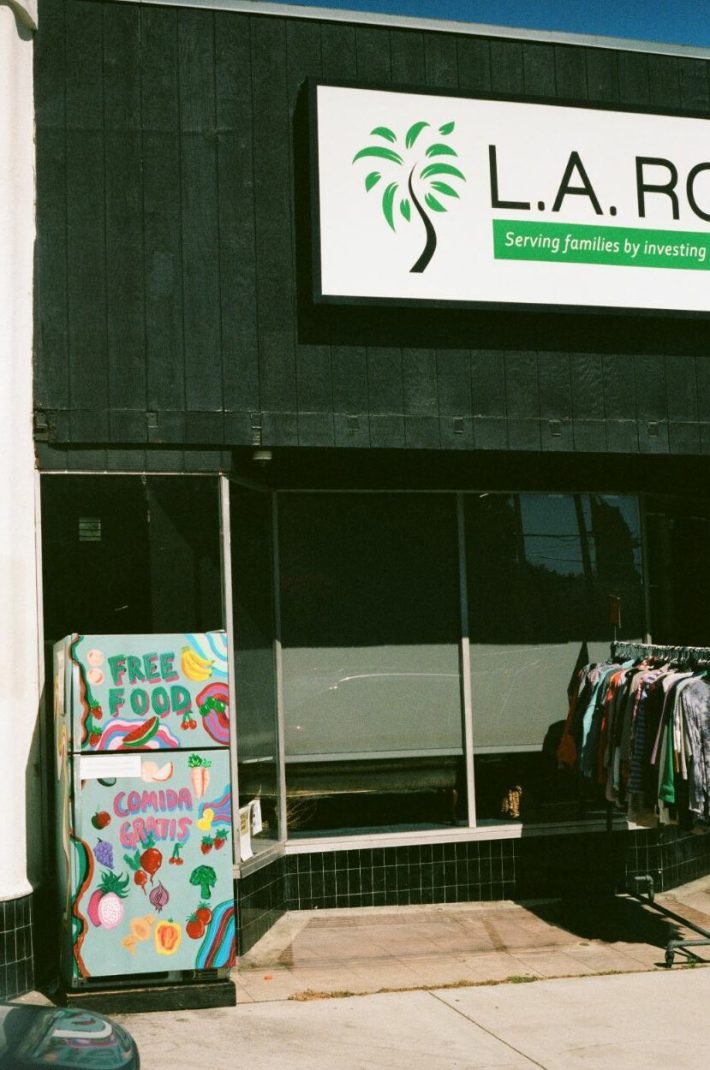
Fridges can be set up outside so the public can constantly access them, but according to the LAFC checklist, they must be hosted in a privately-owned space. That’s because when the fridges first started popping up on sidewalks in 2020, local officials raised issues about having them on public property.
The first Highland Park fridge, along with the first set up in Long Beach and another in Compton, were shut down in 2020 after receiving citations from the city. According to an ABC 7 story, Highland Park organizers were cited by the City of LA Public Works for “obstruction of public right of way.” In Long Beach, they were cited for not having proper food handling permits. In Compton, they received notices for property maintenance and a building department electrical code violation.
Other food mutual aid groups have seen similar challenges. Penelope Uribe-Abee and her family organized the People’s Pantry LA in 2020, which they ran out of her parent’s garage in El Sereno, then moved to a space on Eastern and Gambier. She explains they didn’t face the same legal barriers as fridges because pantries, like hers, often receive food through fiscal sponsors, setting them up to run like a non-profit. Fridges, on the other hand, are community-run, grassroots efforts. So, if they’re in public spaces, they’re more subject to government crackdowns.
Her family started the pantry because they had time during the pandemic. They were constantly working to source and maintain the fridge, so it was like a full-time job for them. Penelope was able to live off unemployment for a while and wanted to use her privilege and resources to contribute.
Penelope and her family recently closed the People’s Pantry. As the world started going back to work, she got a full-time job at the LA City Department of Cultural Affairs and couldn’t commit to the same hours as before. Her dad needed hip surgery, so he couldn’t do the physically demanding labor required to run the pantry, like lifting heavy boxes of canned foods and produce. Her grandmother moved into their family home in need of care. Penelope also started to feel run down and mentally drained. “I definitely am tired [of] running the pantry. It caused a lot of anxiety… It was also this constant fear of, ‘am I going to get sick by opening up the space and seeing so many people?’”
At a certain point, she and her family decided they needed more time to take care of themselves, “And I think that's what it comes down to—it's about money, it's about getting people paid. It's about people being able to take care of themselves as well as take care of others. And I think it would be great if the city poured thousands and millions of dollars into these things,” said Penelope.
The story of Penelope’s family is part of the larger narrative of sustainability within mutual aid organizations. Volunteers often get burnt out working tirelessly against and inside an inherently broken system. But, some have developed strategies to sustainably engage in mutual aid efforts.
All Power Books (APB) opened a fridge inside their community space last June, which is also part of the LACF network. When you step inside, you’ll notice the store’s walls are lined with red, black, and white revolutionary prints, neutral-tone APB merch t-shirts hang from a rack, and the shelves display books like Hadas Thier’s “A People’s Guide to Capitalism,” and Angela Davis’ “Freedom is a Constant Struggle.” It’s located on West Adams Boulevard in West Adams. This working-class, historically Black, South LA neighborhood has seen a recent spike in rent prices, coupled with accelerating gentrification and pricey eateries like Tartine Bakery. Home prices now soar past seven figures.
Organizers with APB acknowledge that they’re taking space in that area with their new store but emphasize that they’re offering essential services for the neighborhood, where serving longtime residents is their central mission. APB employee Kai Nguyen, who helps run the fridge, said it’s part of their service mission. “The fact that food goes really quickly, I think that's also a major point. So there's obviously a huge demand for the fridge being there,” said Kai.
Because their fridge is located inside the store, it prevents 24/7 community access and could discourage some food insecure folks from approaching it. But Kai said because it’s inside, it stays cleaner, there’s no strain on third-party hosts, donations are better managed, and less food goes to waste. They say the APB team rarely has to deep clean it because things don't often go bad, “Our fridge is pretty damn clean.”
Every Saturday, APB will distribute food with a group of volunteers who mostly live nearby. At the end of each distribution, they’ll drop off any excess to other nearby mutual aid groups or fridges. Because they’re able to organize with a team, the work is more evenly distributed. It makes maintaining the fridge a bit easier, establishing a more sustainable mutual aid system, “We all contribute to the maintenance of the fridge, like pretty low lifts. It's not too hard.”
Midnight Books in Whittier also recently opened up an LACF fridge this past March with a more sustainable system in mind. Gabe Sosnowski is one of the main organizers who works there. Like APB, they opened it inside their store, and their paid staff keep it running. They have regular donations from nearby organizations, like race Church Food Bank in La Mirada or Southeast LA Food Not Bombs. The Midnight Books team will communicate with their fellow mutual aid organizers when food needs to be dropped off at another location or delivered to someone in need. They rely on each other to keep distribution in motion.
Gabe, and other mutual aid organizers, believe that the goal should be for every community to build a mutual aid support system. “The pandemic highlighted capitalism's inability to take care of our communities and inspired so many to look to take care of each other,” wrote Gabe in an email.
LACF is just one of several mutual aid organizations in the LA area. It’s a network set up as an alternative support system, operating under a city government that isn’t providing its people with access to food, shelter, and other resources. Organizers within these spaces expect that more fridges will keep popping up in neighborhoods where they can be sustainably run.
People who are food insecure have come to appreciate the fridges as a community resource because it’s much needed in a city of renters, where according to the LA Homeless Services Authority homeless count, the unhoused population increased from 36,165 in 2019 to 41,290 in 2020.
For now, Gabe believes the fridges are here to stay, “This work is sustainable in the sense that we have to do it. We wake up, and we have to do it. There's no other choice. A better world is possible where no one starves, and no one sleeps on the streets, and that's what we strive for.”
If you’d like to volunteer with LACF, check out their website, socials @lacommunityfridges, or email lacommunityfoodshare@gmail.com
This piece was originally published in the LA-based grassroots magazine, Margin of Error, a quarterly publication by Left Out LA. L.A. TACO is co-publishing it.
